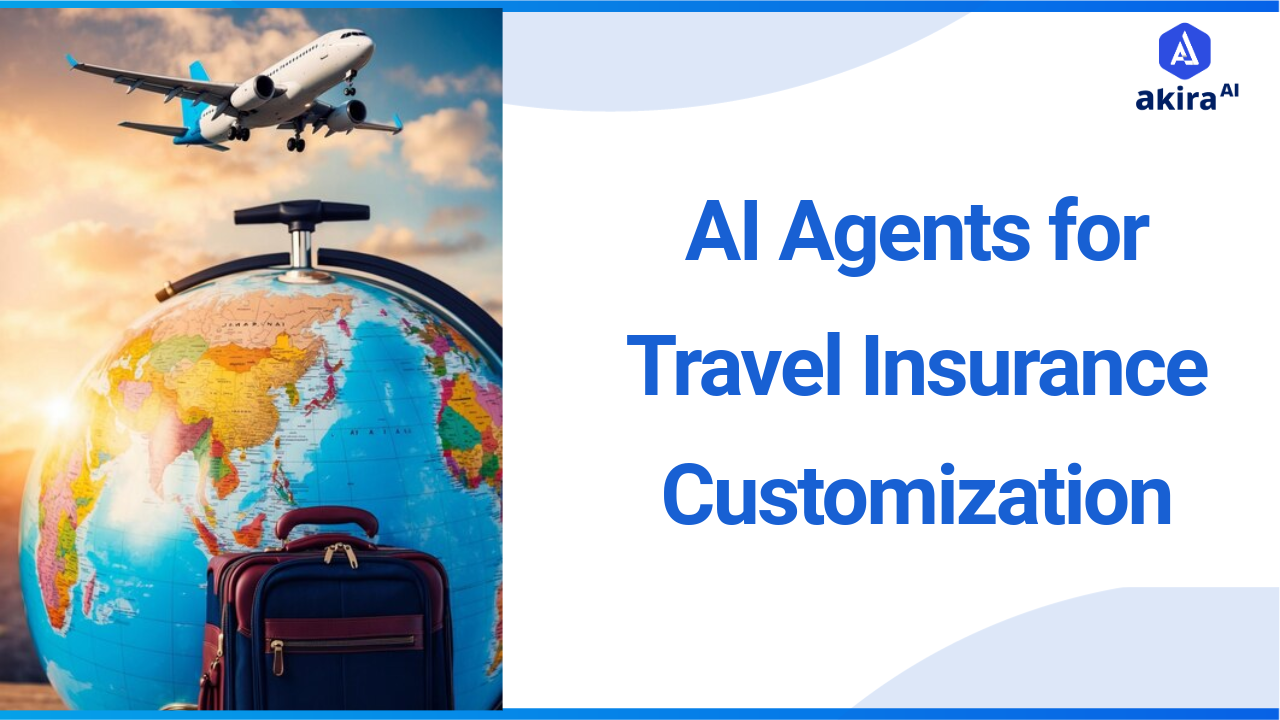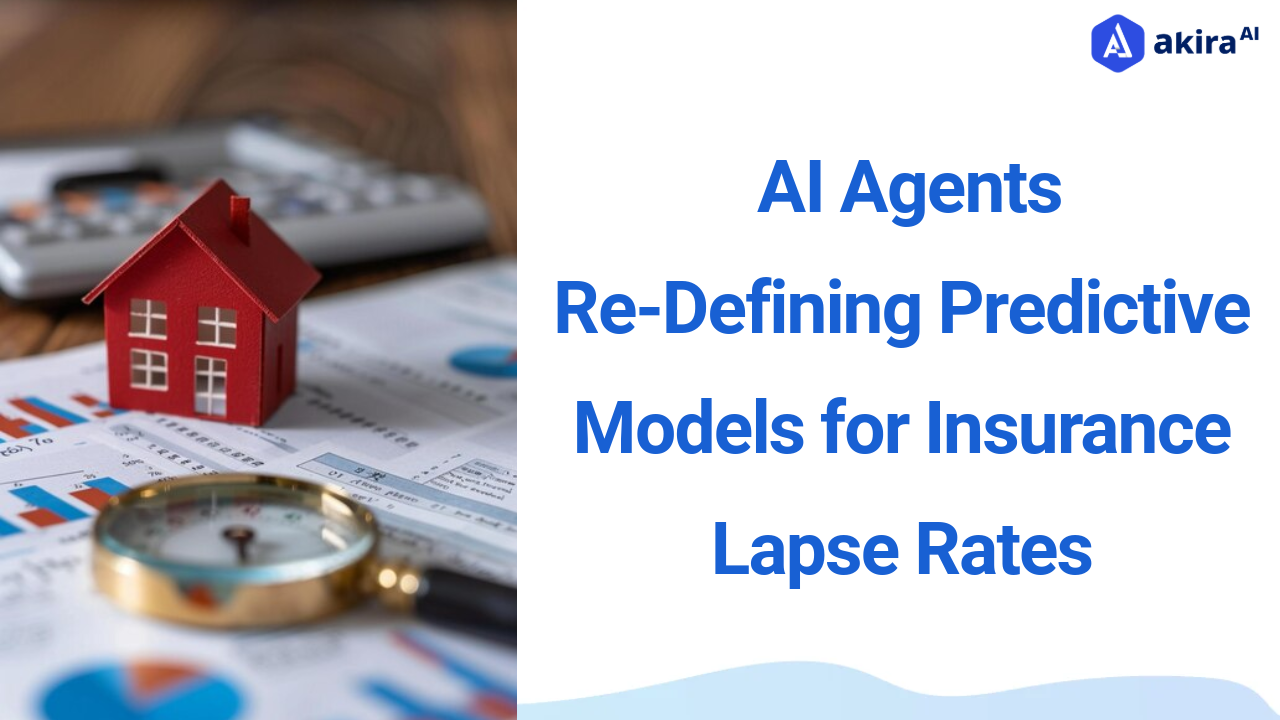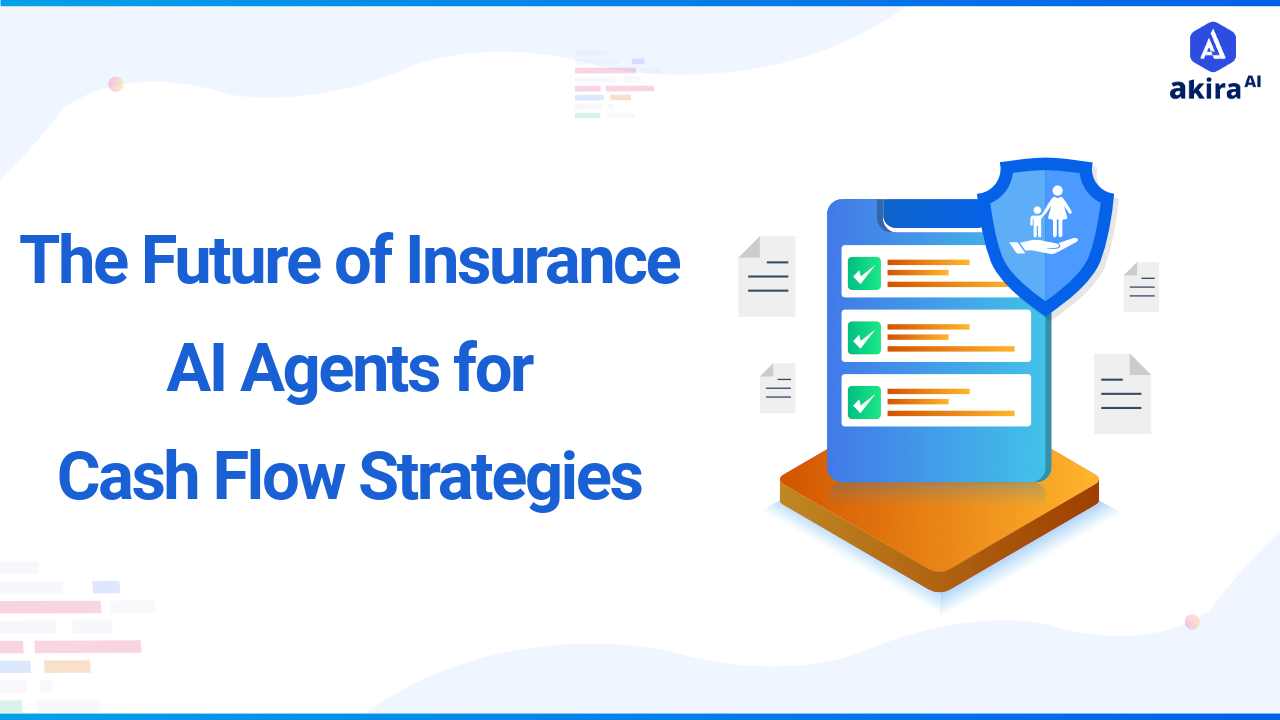Key Insights
-
Travel insurance customization allows travelers to tailor policies based on their specific needs and activities.
-
AI agents enable real-time adjustments to coverage, ensuring protection based on dynamic travel conditions.
-
The technology streamlines claims processing and optimizes cost, improving customer satisfaction and operational efficiency.

Travel insurance is often considered a one-size-fits-all product, offering standard coverage for common travel risks. However, businesses in the insurance industry have recognized that this approach no longer serves the evolving needs of today’s travellers. Companies like yours have begun embracing the idea of offering tailored insurance solutions that allow policyholders to create coverage plans reflecting their unique travel experiences.
Adapting is urgent as more travellers seek these flexible, customised options. This blog delves into how AI agents are transforming travel insurance customization, allowing businesses to deliver more innovative, more efficient services to their clients.
What is Travel Insurance Customization?
Travel insurance customization allows travellers to tailor their insurance policy to meet their specific needs rather than purchasing a one-size-fits-all plan. It enables policyholders to add or remove coverage options based on travel plans, activities, and personal preferences.
Common Customization Options
-
Trip Cancellation & Interruption: This policy covers prepaid expenses if you cancel or shorten your trip due to unforeseen events.
-
Medical Coverage: Adjust limits for emergency medical expenses, including hospital stays and treatments abroad.
-
Adventure & Sports Coverage: Extra protection for skiing, scuba diving, or hiking activities.
-
Baggage & Personal Items Protection: Compensation for lost, stolen, or delayed luggage.
-
Flight Delay & Missed Connection: Reimbursement for expenses due to flight disruptions.
-
Annual vs. Single Trip Plans: You can choose between a single-trip policy or a multi-trip/yearly plan based on travel frequency.
Key Concepts of Travel Insurance
Travel insurance customization involves more than simply allowing users to select from pre-made options. It is about creating a dynamic, personalized experience for each traveller. Here are some key concepts that define this customization:
Personalization: Tailoring insurance policies to meet the specific needs of the traveller, including destination, duration, and planned activities.
Real-Time Adjustments: Modifying coverage dynamically based on changing conditions, such as travel disruptions, weather, or emergency situations.
Data-Driven Decision-Making: Using data from various sources to make informed decisions and offer the most appropriate coverage options.
Automatic Claims Processing: Streamlining the claims process by automating assessments and approvals, ensuring quicker resolution.
Cost Optimization: Balancing the level of coverage with the cost to provide the most efficient and relevant protection for the traveller.
Traditional Way of Travel Insurance Customization
Traditionally, travel insurance has been offered as a rigid product with limited room for customization. Policies are generally standardized with predefined coverage for common scenarios such as trip cancellations, medical emergencies, lost baggage, and delayed flights. While customers can opt for basic plans, there is little to no flexibility to alter or tailor their policies according to unique travel circumstances.
Furthermore, the traditional model often requires significant manual intervention, whether it's for providing quotes, assessing claims, or adjusting coverage. Customers had to rely on customer service representatives to adjust their policies. This process can be time-consuming, frustrating, and prone to errors. Moreover, customers often faced limited options, leading to suboptimal decisions that didn’t fully address their needs.
Impact on Customers Due to Traditional Way of Travel Insurance Customization
The traditional, one-size-fits-all approach to travel insurance results in several challenges for customers:
-
Limited Personalization: Travellers often end up paying for coverage they don’t need or not getting the proper protection for their specific travel plans. For example, someone going on a business trip might not need the same coverage as a backpacker heading into remote areas.
-
High Costs: Due to the standardized nature of traditional insurance policies, customers often end up overpaying. They are forced to select from plans that include unnecessary coverage for situations that may not apply to their travel needs.
-
Slow Claims Processing: Traditional claims processing often requires customers to navigate a lengthy and bureaucratic system, which can delay their ability to receive reimbursement or assistance in emergencies.
-
Lack of Flexibility: Travellers face difficulty adjusting their coverage while moving. For instance, if their travel plans change due to an unexpected situation like a flight cancellation, they may be unable to modify their insurance to match the new circumstances.
Akira AI: Multi-Agent in Action
AI agents analyse travel insurance data at multiple levels to provide a more dynamic and customized experience. Below is an architecture diagram illustrating how AI agents can analyse travel insurance policies and optimize coverage based on individual customer needs:
-
Data Collection Agent: This agent gathers relevant information from various sources, including customer profiles, travel history, claims data, and external risk factors. It also tracks market trends and standardizes the data into a structured format for further processing.
-
Analysis Agent: Once the data is collected, it is processed and analyzed to uncover patterns and trends. It examines travel behaviour, past insurance claims, and market demand to generate insights that help tailor policy recommendations.
-
Risk Assessment Agent: This agent evaluates potential travel risks by assessing historical travel data, claim patterns, and destination-specific hazards. It assigns risk scores to policyholders and identifies high-risk factors, such as frequent cancellations or travel to unstable regions.
-
Policy Recommendation Agent: Using insights from the risk assessment and analysis agents, this agent generates personalized travel insurance policy options. It selects suitable coverage types, adjusts policy limits, and ensures cost-effectiveness while maintaining adequate protection for the traveller.
-
Customization & Issuance Agent: This agent finalizes the policy by integrating customer preferences, risk factors, and policy recommendations. It allows for further customization, such as adding adventure sports coverage or medical protection, before issuing the customer the final Customized Travel Insurance Policy.
Prominent Technologies in the Space of Travel Insurance Customization
Several key technologies are transforming the travel insurance industry, making it more dynamic and personalized. These technologies include:
-
Artificial Intelligence (AI): AI is at the forefront of revolutionizing travel insurance. AI agents can analyze large datasets to recommend and dynamically adjust insurance plans for individual travellers based on their profiles and real-time travel data.
-
Machine Learning: Machine learning algorithms can predict risks, assess patterns in customer behaviour, and offer personalized insurance plans that better reflect the customer’s travel needs.
-
Big Data: By processing large amounts of data from travel itineraries, social media, health records, and past travel experiences, insurers can make more informed decisions on what coverage best fits a traveller’s needs.
-
Blockchain Technology: Blockchain’s transparency and security features are beginning to play a role in claims processing and fraud prevention in the travel insurance sector.
-
Agentic Process Automation (APA): RPA tools automate repetitive tasks in the travel insurance industry, such as data entry and claim processing, improving operational efficiency.
AI-powered agents are revolutionizing the claims adjustment process in insurance by automating key tasks like data collection, damage assessment, and decision-making.
Successful Implementations of AI Agents in Travel Insurance
Several real-world examples highlight the success of AI agents in the travel insurance sector:
-
HDFC ERGO General Insurance Company has utilized AI-powered chatbots, robotic process automation, and voice analytics to assist with policy purchases, claims processing, and customer support. This has significantly reduced policy issuance and claims processing time, enhancing customer satisfaction and operational efficiency.
-
Allianz Partners uses AI-driven chatbots and virtual assistants for customer inquiries, offering personalized policy recommendations based on travel history and preferences. These AI tools have streamlined the customer service process, providing faster responses and more customised coverage options, improving customer engagement.
-
Faye Travel Insurance employs AI to automate the claims process for flight cancellations, baggage delays, and medical emergencies. By guiding customers through the claims journey, Faye has sped up claims processing and reduced complexity, making the process much more seamless for customers.
-
Generali Global Assistance integrates AI-powered chatbots and virtual assistants to manage claims and offer customer support. This AI integration has dramatically improved response times and efficiency, allowing the company to provide immediate assistance and reduce customer wait times.
-
Lemonade Insurance uses AI to handle policy sign-ups, claims, and customer interactions through its AI-powered bot "Maya." The automation has allowed Lemonade to process claims faster and reduce operational costs, offering a transparent and efficient process that enhances the customer experience.
How AI Agents Supersede Other Technologies
AI agents have distinct advantages over traditional technologies in travel insurance customization. Here’s why they stand out:
-
Hyper-Personalization: Policies will be tailored using detailed customer data, adjusting to individual preferences and needs. Real-time adjustments will enhance the travel insurance experience and offer more relevant coverage.
-
Real-Time Risk Assessment: Coverage will adapt instantly to changes in weather, geopolitical events, or travel disruptions. This ensures customers are always protected based on current conditions.
-
Seamless IoT Integration: Travel insurance will connect with IoT devices like wearables to monitor health or activities. Policies will automatically adjust to reflect real-time behaviours and risks.
-
Autonomous Claims Processing: The entire claims process will be automated, from submission to approval, reducing processing time. Claims will be evaluated instantly, improving efficiency.
-
Predictive Analytics: Insurance will use past data and trends to predict future risks, proactively adjusting coverage. Customers will receive timely updates to prevent potential issues.
-
Blockchain Integration: Blockchain technology will ensure that policyholder data is secure, transparent, and tamper-proof. It will provide trust and verification in every transaction.
Final Thoughts on Travel Insurance
AI agents are reshaping the travel insurance industry by offering highly personalized, dynamic, and efficient solutions. By leveraging cutting-edge technologies such as machine learning, big data, and real-time analytics, AI enables insurers to create tailored policies that better meet every traveller's unique needs. As AI continues to evolve, the traditional, static insurance models will be left behind, making way for more intelligent, more responsive solutions that benefit insurers and customers alike.
Next Steps in Insurance
Talk to our experts about how AI agents are transforming travel insurance customization and enhancing personalization and efficiency.


